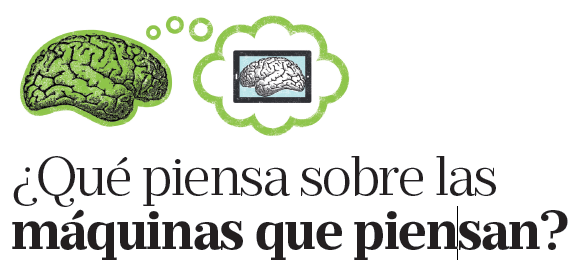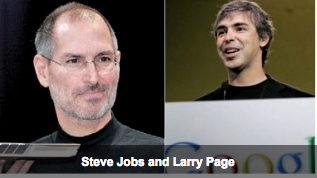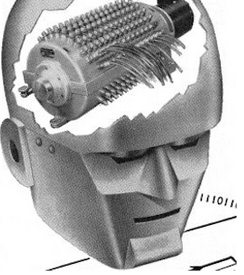Edge in the News

"Science advances by a series of funerals," writes John Brockman, founder of the online discussion forum Edge.org. Sometimes, he says, old ideas have to be put to bed before new ones can flourish. With that in mind, he asked researchers, journalists and other science enthusiasts to weigh in on which established theories need to go. From the replies, Brockman compiled This Idea Must Die, a fascinating smorgasbord of 175 short essays about every field and facet of research. ...
A few of the arguments are bound to be controversial. For example, a journalist asserts that the information gleaned from massive particle accelerators isn’t worth their equally massive price tags. And while Brockman’s question inspired some thought-provoking responses, the short essays can provide only a brief overview of complex problems. Readers will want to do some research of their own before deciding which, if any, of these ideas really requires a funeral.

I was seduced by infinity at an early age. Georg Cantor’s diagonality proof that some infinities are bigger than others mesmerized me, and his infinite hierarchy of infinities blew my mind. The assumption that something truly infinite exists in nature underlies every physics course I’ve ever taught at MIT—and, indeed, all of modern physics. But it’s an untested assumption, which begs the question: Is it actually true? ...
Excerpted from This Idea Must Die, edited by John Brockman. Used with permission.

...[T]he most controversial topics in the field of advanced technologies will be 'artificial intelligence [AI]' of power to be machined...the exponential increase in computing power, represented by Moore's Law, Google, Facebook, Twitter, etc. The emergence of Web services-based (really) big data and machine learning with the Big Data, especially Deep learning techniques environmental changes that seem to apply again sparked a boom in artificial intelligence. ...
What super artificial intelligence will bring the 'existential risk' destruction of the human race? ...[C]omputer scientist Jaron Lanier has an Edge.org comment titled 'The Myth of AI'. Eminent scholars such as Stephen Pinker caused a hot response to the comments. ...[E]dge annual Distinguished members of the cast to one topic comments recipients in 2015 the theme of the event 'What do you think about that machine think?' That decided, and thus the physics In response, psychology, cognitive science, neuroscience, computer science, journalism, art, artificial intelligence, directly or indirectly, related to the field of oneself and others Certified Professional 186...answers have come up. ...

Love is… at root, biology. A host of endocrine-system-regulated hormones relay chemical messages around the body and brain. Complex loops of physiological feedback between endocrine, nervous, and reproductive systems regulate our sexual responses and maintain homeostasis via hormone-producing glands such as the pituitary and thyroid. We feel the effects of ‘love’ throughout our bodies; even with the reproductive system completely excised our hormones would continue their thrilling course. And we feel it in our brains, in our minds. Modulated by hormones such as oxytocin, neurotransmitting chemicals at synapses lead to inhibition or firing of networks of neurons (baby, you flood my synaptic clefts like no other). Firing or inhibition consolidates or weakens these networks – thus do we fall in, or out of, love.
According to Steven Pinker, ‘Love is not all you need, and does not make the world go round.’[1] That is true. However, this fluke of natural selection can come to be our everything. Sometimes, the end of love can be the end of meaningful life (and for an unhappy few, literally the end of life). The neurochemical, neurostructural resonances within close relationships – couples, families, tribes – can gift members a sense of shared purpose. When we draw significance from these bonds, from their apparent strength and continuity, we are often driven to try to shape our environments to uphold and sanctify them. This drive has myriad positive effects, but it can also be perilously narrow. If we are to avoid relationship conservatism – and exclusion of those who do not identify with the love paradigm – we must allow the flourishing of love in the widest possible sense. ...
[1] Steven Pinker, “Evolutionary Genetics and the Conflicts of Human Social Life,” in This Explains Everything: Deep, Beautiful, and Elegant Theories of How the World Works, ed. John Brockman, 1st ed (New York: Harper Perennial, 2013), 45.

"If at first the idea is not absurd, then there is no hope for it," Albert Einstein reportedly said. I’d like to broaden the definition of addiction—and also retire the scientific idea that all addictions are pathological and harmful.
...Scientists have now shown that food, sex, and gambling compulsions employ many of the same brain pathways activated by substance abuse. Indeed, the 2013 edition of the Diagnostic and Statistical Manual of Mental Disorders (the DSM) has finally acknowledged that at least one form of non-substance abuse—gambling—can be regarded as an addiction. The abuse of sex and food have not yet been included. Neither has romantic love.
I shall propose that love addiction is just as real as any other addiction, in terms of its behavior patterns and brain mechanisms. Moreover, it’s often a positive addiction. ...
Excerpted from This Idea Must Die, edited by John Brockman. Used with permission.
There are few more damning responses to a new study or book or proposal than to say that it relies on “anecdotal” evidence — implying not just that the underlying idea lacks seriousness and objectivity, but that the author is lazy or even untrustworthy. Editors also tend to recoil from anecdotal openings for news stories (in part because most anecdotal ledes are awful), and book critics love to display their smartypants-ness by dissing some new volume as anecdotal.
Nicholas Carr, author of “The Shallows: What the Internet is Doing to Our Brains” (2010), wants to rehabilitate the anecdote. So when Edge.org asked him and other thinkers to answer the question “What scientific idea is ready for retirement?” he had his answer. In “This Idea Must Die: Scientific Theories That Are Blocking Progress,” a collection of 175 short essays from top thinkers, Carr makes his case against anti-anecdotalism in two sharp paragraphs: ...
“This Idea Must Die,” edited by John Brockman, is forthcoming from Harper Perennial on Feb. 17.

Stephen Hawking famously warned in 2010 that based on the history of humankind, an alien, more-advanced civilization would probably destroy us. "We only have to look at ourselves to see how intelligent life might develop into something we wouldn't want to meet," he said. Hawking expressed a similar fear of advanced artificial intelligence (AI) machines. In 2014 he pronounced, "The development of full artificial intelligence could spell the end of the human race." Taken seriously, these two statements could even imply that we should neither search for extrasolar advanced civilizations nor strive for superior AI machines.
I was contemplating these issues when I received the annual EDGE question from "intellectual impresario" John Brockman. Every year Brockman sends to about 200 thinkers a single question, and he posts all the answers on his website, edge.org. The question for 2015 was "What do you think about machines that think?"... I strongly recommend reading all the answers, since they are quite fascinating. ...

It’s difficult to deny that humans began as Homo sapiens, an evolutionary offshoot of the primates. Nevertheless, for most of what is properly called "human history" (that is, the history starting with the invention of writing), most of Homo sapiens have not qualified as "human"—and not simply because they were too young or too disabled.
In sociology, we routinely invoke a trinity of shame—race, class, and gender—to characterize the gap that remains between the normal existence of Homo sapiens and the normative ideal of full humanity. Much of the history of social science can be understood as either directly or indirectly aimed at extending the attribution of humanity to as much of Homo sapiens as possible. It’s for this reason that the welfare state is reasonably touted as social science’s great contribution to politics in the modern era. But perhaps membership in Homo sapiens is neither sufficient nor even necessary to qualify a being as "human." What happens then? ...
Excerpted from This Idea Must Die, edited by John Brockman. Used with permission.

This year’s Edge question is "What do you think about machines that think?" My response is less about their likelihood and more about how we should respond, as a society, if this ever comes to pass. Specifically, it involves naches, the Yiddish term for pride and joy...
Read the rest here.

UVM robotics expert contributes essay to world-famous Edge conversation
John Brockman's Edge Question is a major event in the intellectual calendar each year—its roots go back to talks he had with Isaac Asimov and others in 1980. This year's question, "What do you think about machines that think?" drew essays from Daniel C. Dennett, Nicholas Carr, Steven Pinker, Freeman Dyson, George Church and nearly two hundred other luminaries and Nobel Prize winners.
UVM computer scientist and robotics expert Joshua Bongard was asked to weigh in, too. ...
...[R]ead the whole essay. It’s online now and will appear in a printed book as each of the Edge questions—like “What will change everything?” (2009) and “What is your dangerous idea?” (2006)—has for the last decade.

Thinking machines are consistently in the news these days, and often a topic of discussion here at 13.7. Last week, Alva Noë came out as a singularity skeptic, and three of us contributed to Edge.org's annual question for 2015: What do you think about machines that think?
In response to the Edge.org question, I argued that we shouldn't be chauvinists when it comes to defining thinking — that is, we should resist the temptation to restrict what counts as thinking to "thinking like adult humans" or "thinking like contemporary computers." Marcelo Gleiser suggested that we're already living as transhumans, enhanced by our technogadgets and medical improvements. And Stuart Kauffman considered Turing machines, the quantum and human choice.
In addressing the relationship between humans and thinking machines, all three of our responses — and those by many others — raised questions about what (if anything) makes us uniquely human. Part of what's fascinating about the idea of thinking machines, after all, is that they seem to approach and encroach on a uniquely human niche, homo sapiens — the wise.

Domingo 25, de enero do 2015 | lanacion.com (Buenos Aires)

More than 180 scientists, philosophers, writers and technicians responded to the annual call Edge.org website with original reflections on the scope, risks and possibilities of artificial intelligence, a field-edge science that is already bringing the future to present
Artificial intelligence, is one of the most promising developments of modern science, or risk to humanity? Between these two poles, with irony, optimism and caution, the 186 scientists, writers and thinkers convened this year by Edge.org-a website associated with a publisher that promotes thinking and discussion of the art in science, arts and moved literature- to meet its annual question. The collaborators wrote brief essays available on the web ( www.edge.org ) and, like every year, will soon have its publication on paper. Here a selection of their responses.
Pamela McCorduck, Steven Pinker, Irene Pepperberg, Thomas A. Bass, Paul Davies, Nicholas G. Carr.
— Oh, to have lived in the age of the Parisian salons of the Enlightenment and been privy to some of the great intellectual discussions that went on there between writers, artists, philosophers, politicians and perhaps some budding scientists. Then again, I'm rather fond of the 21st century ands its modern medicine, indoor plumbing and smart websites. On the subject of clever websites, I give you Edge.org, which is a place where brilliant minds from many disciplines gather to mull a big annual question. In 2014, the annual question was "What scientific idea is ready for retirement?"
The responses covered things like the concept of race, barriers of scientific understanding, Moore's Law and the robustness (or lack thereof) of large studies. There's a lot to wade through there, but if you're into science, it's worth a peek.

[Translation:] The young stars of the new culture and a very optimistic vision of changing the world. Mark Zuckerberg, Facebook founder, said: "My goal was never to just create a company ... but that something to do with that creates a very large change in the world ... a social mission, our goal was to make the world a more open place and one that brings people closer together...

Apple's former leader, Steve Jobs was equally ambitious: "Everyone has the impression that this is a moment which influence the future ... who is quite foolish to think that they can change the world, they should also be changed! "
Larry Page, Google's co-founder, said: "We want to build a technology that everyone will be using, and which will affect everyone ... I'm trying to focus on the results: What will be the future? And how do we do this we will create the future? ... If you just change the world, it is important things you deal with - and why are you going to get up in the morning your bed excitedly ... "Sergey Brin, Google's other founder is thinking as follows:" We want you to Google the human brain third future of work would ... Eventually I want to see the world as a whole communicates knowledge available to our brain would want ... As a man, to see who has created a great change in the world ... "
Stars and Thinkers
The third culture stars are generally inclined to be gnostics or atheist. But who and what are the authoritative thinkers of this new culture?
The term "third culture" originally comes from American writer John Brockman, who, in 1995* presented this set of ideas in his book The Third Culture: Beyond the Scientific Revolution. According to Brockman: "The third culture consists of those scientists and other thinkers in the empirical world who, through their work and expository writing, are taking the place of the traditional intellectual in rendering visible the deeper meanings of our lives, redefining who and what we are."
The book presents the work of 23 scientists and philosophers, who are the central third culture thinkers. In the 1980s and '90s, these thinkers were presented and discussed their views, and Brockman has followed up and created a popular portal (meetings of The Reality Club www.edge.org ), on which the discourse has continued.
"Unlike previous intellectual pursuits, " he writes, the achievements of the third culture are not the marginal disputes of a quarrelsome mandarin class: they will affect the lives of everybody on the planet....
"Unlike previous intellectual pursuits, the achievements of the third culture are not the marginal disputes of a quarrelsome mandarin class: they will affect the lives of everybody on the planet."—insists Brockman. The formation of the universe, the origin of life , of human consciousness are central issues explored by the third culture intellectuals. Scientific topics include molecular biology, artificial intelligence, artificial life, chaos theory, the strong parallelism, artificial neural networks, the inflationary universe, fractals, biodiversity, nanotechnology, virtual reality, cyberspace, quantum computers, cloning and robotics. … The third-culture thinkers are the new public intellectuals."… [MORE]
Original Hungarian language version
[* ED. NOTE: My essay "The Emerging Third Culture", was first published by the Los Angeles Times on November 28. 1991 along with an accompanying profile. The essay is reprinted on Edge as is the entire book, The Third Culture: Beyond the Scientific Revolution (1995). The paperback edition of the book (Simon & Schuster) is in print and availabe. (Amazon | B&N).

Every January the intellectual impresario and literary agent John Brockman (who represents me, I should disclose) asks a large group of thinkers a single question on his website, edge.org. This year it is: “What do you think about machines that think?” There are lots of interesting answers, ranging from the skeptical to the apocalyptic.
I’m not sure that asking whether machines can think is the right question, though. As someone once said, it’s like asking whether submarines can swim. But we can ask whether machines can learn, and especially, whether they can learn as well as 3-year-olds. ...

180 intellectuals responded to this Edge annual question - "What do you think about computers that think?" Soon this question may become an issue for all of us
"What do you think about computers that think?" The question for 2015 on the prestigious Edge.org site. Each year the site gives the same question to more than 180 intellectuals and publishes their answers in one sequence, later published as a thick book. Respondents ranged from columnists in The New York Times, Nobel Prize winners, best-selling authors, and heroes of the technology world, many of them close friends of the site's colorful editor, literary agent John Brockman. Previously published questions: "What scientific concept has to retire?", "What tools will improve everyone's thinking?" and "What should we be worried about? ". This year, as mentioned, Brockman called 180 intellectuals to express an opinion on the question Hawking has been talking about. And Disclosure: I was delighted to receive an invitation to participate this year in most of this dialogue, and my response, ordered to be short - even short of this column - for the annual anthology published.
Several respondents, including the writer Pamela McCorduck, Italian physicist Carlo Rovelli, Professor Margaret Levi of Stanford University and the Israel Prize laureate and former president of the Weizmann Institute Haim Harari, refer to machines that think as inevitable, and in large measure daily. Interest in human responsibility and proper management like any other field, and material nightmares. More than the machines thinking like people, I am concerned about people who think like machines, writes Harari.
Others relate to the very dismissive forecast: Vice President for Research of the George Washington University, Neurobiologist, Leo Chalupa doubts machines will be capable of abstract thought. Science fiction writer Bruce Sterling writes that computers may be major players in the future, but the script will never write people. They further emphasize emotion and will remain forever confined to human beings.
 Over at BB pal John Brockman's Edge.org, nearly 200 very smart people, like Daniel C. Dennett, Brian Eno, Alison Gopnik, Nina Jablonski, Peter Norvig, and Rodney Brooks, ponder the EDGE Annual Question of 2015: What do you think about machines that think?
Over at BB pal John Brockman's Edge.org, nearly 200 very smart people, like Daniel C. Dennett, Brian Eno, Alison Gopnik, Nina Jablonski, Peter Norvig, and Rodney Brooks, ponder the EDGE Annual Question of 2015: What do you think about machines that think?
This week's Nova magazine features contributions from
Frank Tipler, Paul Saffo, Tomaso Poggio, Nicholas Carr, Kevin Kelly,
Juan Enriquez, Peter Norvig, Jochi Ito, Julio Boccaletti, Carlo Rovelli,
Douglas Coupland, and Haim Harari









